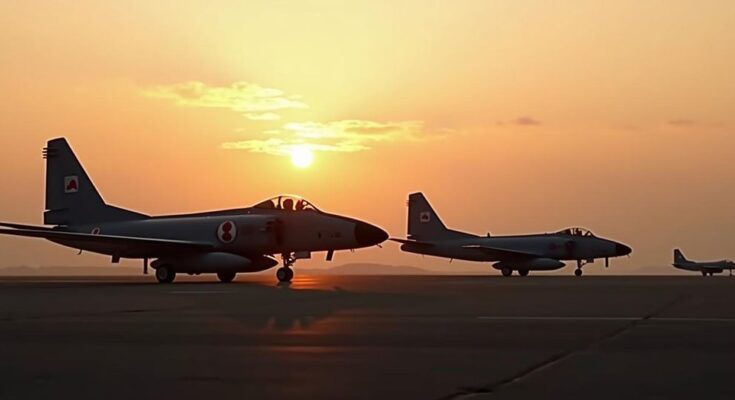Two Air Self-Defense Force C-2 transport planes have departed Japan to facilitate the possible evacuation of approximately 50 Japanese citizens from Lebanon due to heightened tensions between Israel and Hezbollah. The situation has escalated to military actions, including Israeli ground operations and retaliatory strikes from Iran, highlighting Japan’s commitment to the safety of its nationals abroad in a volatile geopolitical context.
On Thursday, the Japan Air Self-Defense Force (JASDF) dispatched two C-2 transport aircraft from Miho Air Base in Tottori Prefecture en route to Jordan and Greece. This mission is part of preparations to potentially evacuate approximately 50 Japanese nationals currently in Lebanon amidst escalating tensions between Israel and Hezbollah, the Iranian-backed militant organization. The Japanese Defense Ministry has established a 500-member joint task force following an order from former Defense Minister Minoru Kihara on September 27, which included seeking permission from other nations to utilize their airspace for this operation. The crisis in Lebanon has intensified, particularly after the Israeli military commenced “limited, localized” ground operations targeting Hezbollah, marking the first Israeli ground invasion of Lebanon since 2006. This escalation comes in the wake of several attacks, including detonations targeting Hezbollah members and multiple Israeli airstrikes on Hezbollah’s facilities in Beirut. In a show of retaliation, Iran fired ballistic missiles at Israel, further complicating the geopolitical landscape. Japan, which relies significantly on crude oil imports from the Middle East, has historically maintained a policy of balanced diplomacy between Israel and Arab states, supported by the United States, its ally in security matters. To date, Japan has executed eight airlift operations to evacuate its citizens from foreign territories, including two from Israel following Hamas’s surprise attack on the nation last year.
The geopolitical situation in Lebanon has become increasingly volatile due to ongoing hostilities between Israel and Hezbollah. This deterioration of security has prompted the Japanese government to take precautionary measures for the safety of its nationals in the region. Japan’s previous engagement in airlift operations underscores its commitment to protecting its citizens abroad and illustrates the complexities of international relations in a region critical to its energy security. The relationship between Japan and both Arab nations and Israel has been characterized by careful diplomacy, reflecting Japan’s dependence on Middle Eastern oil and its strategic alliances. Recent events, including Iranian military actions, exacerbate the regional tensions, necessitating Japan’s proactive stance. The historical context of diplomatic relations also sheds light on Japan’s operational responses, as it has been involved in similar missions during crisis scenarios in the past.
In summary, Japan’s deployment of Air Self-Defense Force aircraft to Lebanon highlights the country’s readiness to protect its citizens amid escalating regional tensions. The deteriorating situation involving Israel and Hezbollah, along with Iran’s retaliatory actions, necessitates a vigilant response from the Japanese government. Japan’s consistent approach to balancing diplomatic relations in the Middle East is evident through its evacuation preparations, reflecting both its values of safety for its nationals and the complexities of international diplomacy in a conflict-ridden area.
Original Source: english.kyodonews.net




